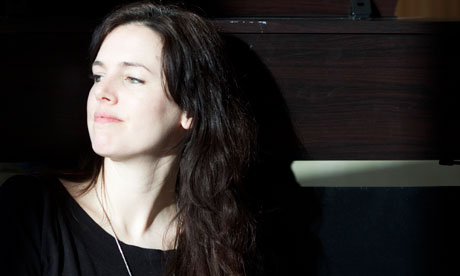
Classical composer Anna Meredith. Photograph: David Levene
I hate the old adage that creative work from women and men comes
from a different place; you know, that lasses are writing music
inspired only by the sea/Japanese court love poetry/constellations
(delete as appropriate) whereas men only write forward-thrusting,
rhythmic, dynamic scores. In the same way that Kathryn Bigelow can
direct a movie about sweaty men blowing each other up in Iraq, women can
write driving, funky bombasts (see
Anna Meredith and
Tansy Davies).
Orlando Gough wrote a one-woman opera based in a domestic setting, and
I've performed plenty of beautiful, melodic delicacies composed by
chaps. Everyone is different. Everyone writes different sorts of music.
Enough said.
But is there a gender gap in the music industry? Well
yes. The facts are clear: 14% of the PRS for Music Foundation's (the
Performing Rights Society of composers, songwriters and music
publishers) members are female. In the BBC Proms 2011, three out of 11
new commissions were from female composers (with a further one in 10 of
other significant premieres). The British Composer Awards did have a
bumper season in 2010, with half the number of winners being female,
though it seems this might have been an anomaly: in 2011, there were six
female composers out of 43 nominated.
I don't believe there's a
cabal of grunting old men in darkened, smoky rooms putting big crosses
over scores submitted by ladies. I've never felt discriminated against
in the slightest, so rest assured I am not setting fire to my piano to
rage against the dying of the light. It's simply true to say that there
are more professional male music creators than female out there. For
some reason, it's taking a lot longer than in literature and the visual
arts to reach equilibrium. It was deemed (just about) acceptable by the
19th century for female writers to be published, yet it's only in the
last couple of decades that female composers have really emerged,
blinking, out of their garrets and into publishing houses and record
label offices; so, without a little helping hand, there might be a long
way to go yet.
So wherefore the imbalance? Look a little further
down the chain, and you'll consistently see more eager male teenage
composers than female; there's a real dropping-off in confidence in
teenage girls to compose. At Junior Trinity – a Saturday school for
talented young musicians where I teach – there are more female students
than male, but only a third of students studying composition are girls.
At
an all-girls' school workshop I ran recently, the music teacher said it
was brilliant for the students to see, with their own eyes, a real live
professional female composer. At GCSE and A-level, the classical
composers studied in set works are almost exclusively male. And white.
Oh, and dead. It's glaringly obvious: if girls are presented with
examples of successful female creators in all genres, they might view
composition as a viable profession for themselves.
Positive
prejudice goes some way to helping this. Last year, the PRS for Music
Foundation, looking at their alarming statistics, decided to do
something about it, funding 28 projects through their
Women Make Music scheme (including me, with a project on
British birds in folklore. ). And today, UK Music
launched their Equality & Diversity charter,
encouraging organisations, businesses and individuals to commit to two
or more actions to help improve equality and diversity in 2012.
No
doubt some people would say this is political correctness gone mad.
They're wrong. These are great initiatives – not just for women, of
course, but – in UK Music's case – for people of different ethnic
backgrounds and for people with disabilities.
We need, however, to
address the inequality at the nub: those writing the curriculum, the
National Music Plan, and teachers at all levels should make an effort to
use examples of music by women in the classroom; to promote composition
as a living, breathing, utterly unisex profession.
There would be
no greater achievement for me and my female peers to see that we've
inspired more girls to follow a similar path – but it's down to
educators, programmers and organisations to help.
• Follow Comment is Free on Twitter
@commentisfree


